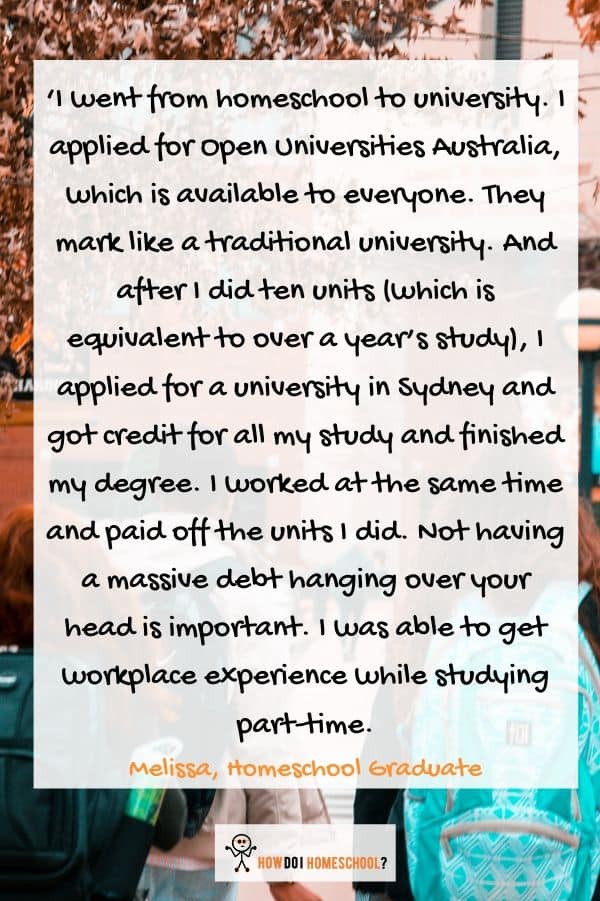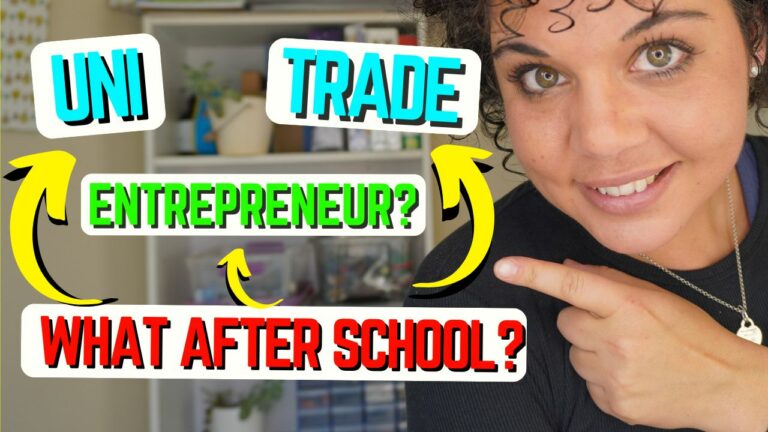Worried that your homeschooler won’t make it to college, university, or snag a trade? Don’t fret, you’re not alone in this concern. It turns out that many homeschooling parents, like my parents (I was homeschooled), face the same dilemma when their kids reach their later high school years. About half of the families in my homeschooling group took the leap and sent their teenagers to school. Why, you may ask? Well, tackling subjects like calculus and chemistry on our own can be quite the brain teaser, pushing some home-educating parents to tap out.

I hope you enjoy reading this blog post. If you want to do my course on how to homeschool, click here.
On the other hand, those superhero parents who manage to keep educating at home often succumb to their teenagers’ wishes to experience the high school scene.
They believe that at this age, their kids are finally ready to make responsible choices and navigate the treacherous world of high school morality.

Why You Should Homeschool Through High School
Elizabeth Smith, the wife of HSLDA President, J. Michael Smith, says parents should homeschool through high school.
She gave the following reasons parents should persevere through homeschooling in the latter years.
Smith says homeschooling through the high school years is better because:
- Homeschooling cements teenagers’ relationships within the family, so they last a lifetime. Smith says homeschooling is as useful in high school as in junior school. The same reasons to homeschool apply to older teens as they do to younger children.
- It helps stop teenagers from becoming confused as they must serve ‘two masters’ when at school: parents and the school/peers.
- One-on-one teaching is the most efficient way to learn. This education is usually only provided at home due to high teacher/student ratios in schools.
- Homeschooling means students can choose to learn what interests them with the right curriculum. The right curriculum will make learning easier.
- Teenagers can skip high school (see video below) and continue to tertiary education through higher education institutes (discussed below).
- Parents can influence peer relationships more and oversee the time spent in and outside the family.
- Parents can protect children from the need to conform by keeping them in an environment where they’re free to think about things without having to accept a bloated and politically correct agenda like that found in many public schools.
- It allows more flexibility than school.
- Homeschooling keeps children in a safe environment, away from potential places with high volumes of drugs or violence.[i]
Secondary Education Leading to University
- TAFE,
- Open Universities and
- the Open Training and Education Network).
These are the pathways my family took to tertiary education.
Below, we’ll also cover how homeschoolers enter university or tertiary education facilities without an HSC or ATAR score.

Open Training and Education Network (OTEN)
My older brother, Joshua, completed his HSC through the Open Training and Education Network (OTEN or TAFE).
OTEN is correspondence education for Year 10-12 students.
It runs through all the fundamentals of education that public school students study.
OTEN students study elective and mandatory units like school students.
After completing Year 10, TAFE grants a Year 10 certificate students can use to enter TAFE or other tertiary institutes.
Although TAFE might not call it OTEN today, they have similar program homeschoolers can acquire a Year 10 school completion certificate through.
Alternatively, after completing Year 12 with OTEN, homeschoolers can earn an HSC score.
This score is used to enter university or other higher education facilities.
If an ATAR score is too low, a bridging course with your chosen university can sometimes cover the gap between the existing and mandatory university entry scores.
With a bridging course, a student will sign up for a few units, and then, if they’re done to the required standard, they will be admitted into their desired course.

Tertiary Preparation Certificate (TPC)
University Bridging Courses
As mentioned, homeschoolers can get into university by doing a bridging course – almost all universities has its own bridging course these days.
One such bridging course is UC-Start or UC Connect (but, perhaps this name is outdated by now).
The University of Canberra, where I studied, has a bridging program designed for students called UC-Start.
This bridging program allows students with inadequate high school marks (or unrecognized education backgrounds like homeschooling) indirect entry into many courses if they satisfactorily complete two relevant units of the desired degree (equal to 6-months study).
When these two units are completed successfully, students have already made a start on their course as the units are credited.
That is, these two units are credited towards the desired degree and, upon completion of the bridging course, homeschoolers will have made a 2-unit or 6-month start into their desired course.
Other university bridging courses similar to UC-Start are available in most Australian universities today.
Online Universities
Students can get a foot into university by studying with online universities. One popular one is Open Universities.
Anybody can do a unit at Open Universities.
Technical and Further Education (TAFE)
Tertiary Education (University, College, TAFE, Entrepreneurial Ventures)
Homeschoolers are now far from disadvantaged when applying for universities.
Surviving in an unfamiliar environment – will my child fit in?
We found that [homeschoolers] experienced college in many of the same ways that other, non-homeschooled students, did. In most regards, their undergraduate experiences were unidentifiable from the overall student population: they were normal college students.[iv]
Because of the experience gained in the wider community before university, homeschooling university graduates usually find jobs quickly after university.

Entrepreneurial Ventures
While most homeschoolers aim for university, a handful start entrepreneurial ventures.
Gary Knowles, an Education Professor at the University of Michigan, found many homeschoolers involve themselves in entrepreneurial professions that encourage independence [viii].
A high proportion of homeschoolers like doing things independently– just like they did when homeschooled.
Having grown up teaching themselves different types of skills, many homeschoolers find entrepreneurial ventures are a natural step into working life (see Sean’s interview about his homeschool entrepreneurship here).
Nathanael van der Kolk is a homeschooling entrepreneur. He talked about his experience in his submission to the 2014 Parliamentary Inquiry:
Mr Nathanael van der Kolk outlined that his experience with homeschooling enabled him to have a ‘tailor-made education, to build my skills…and to be able to jump into being an entrepreneur at a young age’. He informed the committee that from 16 to 22 years old he could grow his abilities and learning about search engine optimisation and web design, enabling him to become a young entrepreneur and Director of the Australian Institute of Internet Marketing at age 24.[ix]
Evidence given to the Inquiry showed many homeschoolers are also involved in family businesses.
Some homeschoolers continue to work in these businesses after they finish formal education.
Perhaps we should encourage some of our teens to think creatively and consider starting their own businesses instead of going through traditional routes through TAFE or University.

Subscribe to How to Homeschool (my Youtube channel!)
Have you caught the homeschooling bug?
Eager to delve deeper into the realm of unconventional education?
Well, my curious comrades, rejoice!
There are splendid avenues awaiting your exploration.
Firstly, hop on over to my YouTube channel, where a treasure trove of homeschooling wisdom awaits. From practical tips to delightful anecdotes, I unravel the mysteries of homeschooling with a touch of wit and wisdom.
Subscribe, hit that notification bell, and embark on an enlightening journey with me.
Enroll in the Homeschool Parenting Program
For those yearning for a comprehensive guide to homeschooling, look no further than my Homeschool Parenting Program.
This illustrious online course will equip you with the knowledge, strategies, and confidence to navigate the exhilarating world of homeschooling like a seasoned pro.
Enroll today and unlock the door to extraordinary educational possibilities.
Conclusion: How Do Homeschoolers Get to College, University, or TAFE?
Today there are many ways homeschoolers can get to college, university, and TAFE. Indeed, there are plenty of easy tertiary options available, including entrepreneurship. Furthermore, home-educating parents can feel confident their children will fit in well if they choose these options. Personally, I’ll be encouraging my children to go down the entrepreneur pathway, but it’s each to their own!
References:
[i] Smith, E. Why Homeschool Teens? Homeschool Legal Defense Association. Retrieved on 24 January 2017, from http://www.hslda.org/highschool/docs/TenReasonsHTHS.asp.[ii] Galloway, R. (1995, April). Homeschooled Adults: Are They Ready for College? Paper presented at the annual meeting of the American Educational Research Association, San Francisco, CA, p. 18.[iii] Ray, B. (2012). A Brief Review of ‘The Impact of Homeschooling on the Adjustment of College Students by Drenovsky and Cohen. Home School Researcher. 28 (1) p. 8.[iv] Bolle-Brummond, MB and Wessel, R. (2012). Homeschooled students in college: Background influences, college integration, and environmental pull factors. Journal of Research in Education. 22 (1) p. 223-249.[v] Galloway, R and Sutton, J. (1997). College Success of Students from Three High School Settings: Christian School, Home School and Public School. Paper presented at the National Home Educators Leadership Conference, Boston, MA.[vi] Ibid.[vii] Ibid.[viii] Ray, B. (2003). Worldwide Guide to Homeschooling. Broadman and Holman Publishers. p. 71. Also see Swanbrow, D. (1993). Study: Home-educated children not disadvantaged. University of Michigan.[ix] NSW Government. (2014). Parliamentary Inquiry into Homeschooling. pp. 37-38.



